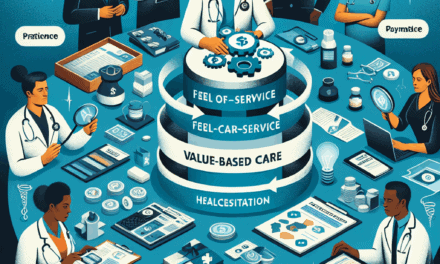Molina Completes Acquisition of ConnectiCare: A New Era in Healthcare
The healthcare landscape is constantly evolving, with mergers and acquisitions playing a significant role in shaping the industry. One of the most notable recent developments is Molina Healthcare’s acquisition of ConnectiCare, a move that promises to enhance service delivery and expand access to quality healthcare. This article delves into the implications of this acquisition, exploring its background, strategic motivations, operational impacts, and future outlook.
Background of Molina Healthcare and ConnectiCare
Molina Healthcare, founded in 1980, is a leading provider of managed healthcare services, primarily serving low-income individuals and families. The company operates in multiple states, offering Medicaid and Medicare plans, as well as health insurance for the uninsured. Molina has built a reputation for its commitment to providing quality care and improving health outcomes for its members.
ConnectiCare, on the other hand, is a well-established health insurance company based in Connecticut. Founded in 1981, it has been a significant player in the state’s healthcare market, offering a range of health plans, including individual, family, and employer-sponsored insurance. ConnectiCare is known for its customer-centric approach and innovative health solutions, making it a valuable asset in the healthcare sector.
The acquisition of ConnectiCare by Molina Healthcare marks a significant milestone for both companies. It not only expands Molina’s footprint in the Northeast but also enhances its ability to serve a broader demographic, particularly in Connecticut, where ConnectiCare has a strong presence.
Strategic Motivations Behind the Acquisition
The decision to acquire ConnectiCare was driven by several strategic motivations that align with Molina’s long-term goals. Understanding these motivations provides insight into the potential benefits of the acquisition.
- Market Expansion: One of the primary motivations for Molina’s acquisition of ConnectiCare is market expansion. By entering the Connecticut market, Molina can tap into a new customer base and increase its membership. This is particularly important as the healthcare industry becomes increasingly competitive, with companies vying for market share.
- Diversification of Services: The acquisition allows Molina to diversify its service offerings. ConnectiCare has a strong portfolio of health plans and services that complement Molina’s existing offerings. This diversification can lead to improved customer satisfaction and retention.
- Enhanced Care Delivery: Molina’s commitment to improving health outcomes aligns with ConnectiCare’s focus on customer-centric care. By combining resources and expertise, the two companies can enhance care delivery, leading to better health outcomes for members.
- Operational Synergies: Mergers and acquisitions often lead to operational synergies that can reduce costs and improve efficiency. Molina can leverage ConnectiCare’s existing infrastructure and technology to streamline operations and enhance service delivery.
- Regulatory Advantages: The acquisition may also provide Molina with regulatory advantages. By expanding its presence in Connecticut, Molina can better navigate state regulations and policies, ensuring compliance while maximizing opportunities for growth.
These strategic motivations highlight Molina’s vision for the future and its commitment to providing quality healthcare services to a broader audience. The acquisition is not just about growth; it is about enhancing the overall healthcare experience for members.
Operational Impacts of the Acquisition
The operational impacts of Molina’s acquisition of ConnectiCare are significant and multifaceted. Understanding these impacts is crucial for stakeholders, including employees, members, and healthcare providers.
- Integration of Systems: One of the first challenges following the acquisition will be the integration of systems. Molina will need to harmonize its operations with ConnectiCare’s existing infrastructure, including IT systems, claims processing, and customer service platforms. This integration is essential for ensuring a seamless transition for members and providers.
- Workforce Considerations: The acquisition will also have implications for the workforce. Molina will need to assess staffing needs and determine how to best utilize ConnectiCare’s employees. This may involve training programs to align staff with Molina’s corporate culture and operational practices.
- Member Communication: Effective communication with members is critical during the transition period. Molina must ensure that ConnectiCare members are informed about changes to their plans, benefits, and services. Clear communication can help alleviate concerns and build trust among members.
- Provider Relationships: Maintaining strong relationships with healthcare providers is essential for both companies. Molina will need to engage with ConnectiCare’s network of providers to ensure continuity of care and address any concerns related to the acquisition.
- Regulatory Compliance: The acquisition will require Molina to navigate various regulatory requirements at both the state and federal levels. Ensuring compliance with these regulations is crucial for maintaining licenses and certifications, as well as for avoiding potential legal issues.
Overall, the operational impacts of the acquisition will require careful planning and execution. Molina’s ability to effectively manage these changes will play a significant role in the success of the integration.
Financial Implications of the Acquisition
The financial implications of Molina’s acquisition of ConnectiCare are a critical aspect of the deal. Understanding these implications can provide insights into the potential return on investment and long-term sustainability of the acquisition.
- Cost of Acquisition: The financial details of the acquisition, including the purchase price, are essential to consider. While specific figures may vary, the cost of acquiring ConnectiCare will impact Molina’s financial statements and may influence its stock performance in the short term.
- Revenue Growth Potential: One of the primary motivations for the acquisition is the potential for revenue growth. By expanding its membership base in Connecticut, Molina can increase its premium revenue. This growth potential is particularly important in a competitive market where attracting new members is crucial.
- Cost Synergies: Mergers and acquisitions often lead to cost synergies that can improve profitability. Molina may be able to reduce operational costs by streamlining processes and eliminating redundancies. Identifying and realizing these synergies will be key to maximizing the financial benefits of the acquisition.
- Investment in Technology: To enhance service delivery and improve operational efficiency, Molina may need to invest in technology upgrades. While this may require upfront costs, the long-term benefits of improved technology can lead to better member experiences and increased efficiency.
- Impact on Stock Performance: The acquisition may also impact Molina’s stock performance. Investors will closely monitor the integration process and its financial outcomes. A successful acquisition that leads to increased membership and profitability could positively influence Molina’s stock price.
In summary, the financial implications of the acquisition are complex and multifaceted. Molina’s ability to navigate these challenges will be critical to ensuring the long-term success of the deal.
Future Outlook for Molina and ConnectiCare
The future outlook for Molina Healthcare following its acquisition of ConnectiCare is promising, but it also presents challenges that must be addressed. Understanding this outlook can provide valuable insights for stakeholders.
- Increased Market Share: With the acquisition, Molina is poised to increase its market share in the Northeast. This expansion can lead to greater brand recognition and a stronger competitive position in the healthcare market.
- Enhanced Member Experience: By leveraging ConnectiCare’s strengths in customer service and innovative health solutions, Molina can enhance the overall member experience. This focus on member satisfaction is crucial for retention and attracting new members.
- Focus on Value-Based Care: The healthcare industry is increasingly shifting towards value-based care models. Molina’s acquisition of ConnectiCare aligns with this trend, as both companies prioritize improving health outcomes and reducing costs. This focus can lead to better care for members and increased efficiency.
- Potential Challenges: While the outlook is positive, there are potential challenges that Molina must navigate. These include managing the integration process, addressing workforce concerns, and ensuring regulatory compliance. Successfully overcoming these challenges will be critical for long-term success.
- Innovation and Growth Opportunities: The acquisition opens up new avenues for innovation and growth. Molina can explore new product offerings, partnerships, and technology investments that can further enhance its service delivery and member engagement.
In conclusion, the future outlook for Molina Healthcare following its acquisition of ConnectiCare is bright, with significant opportunities for growth and improvement. However, careful management of the integration process and a focus on member satisfaction will be essential for realizing the full potential of this acquisition.
Conclusion
The acquisition of ConnectiCare by Molina Healthcare represents a significant development in the healthcare industry. With strategic motivations centered around market expansion, service diversification, and enhanced care delivery, Molina is well-positioned to leverage ConnectiCare’s strengths to improve health outcomes for its members.
While the operational and financial implications of the acquisition present challenges, they also offer opportunities for growth and innovation. As Molina navigates the integration process, its commitment to member satisfaction and regulatory compliance will be critical for success.
Ultimately, the acquisition of ConnectiCare marks a new era for Molina Healthcare, one that promises to enhance access to quality healthcare services and improve the overall healthcare experience for members. As the healthcare landscape continues to evolve, Molina’s strategic decisions will play a pivotal role in shaping its future and the future of healthcare in the regions it serves.





